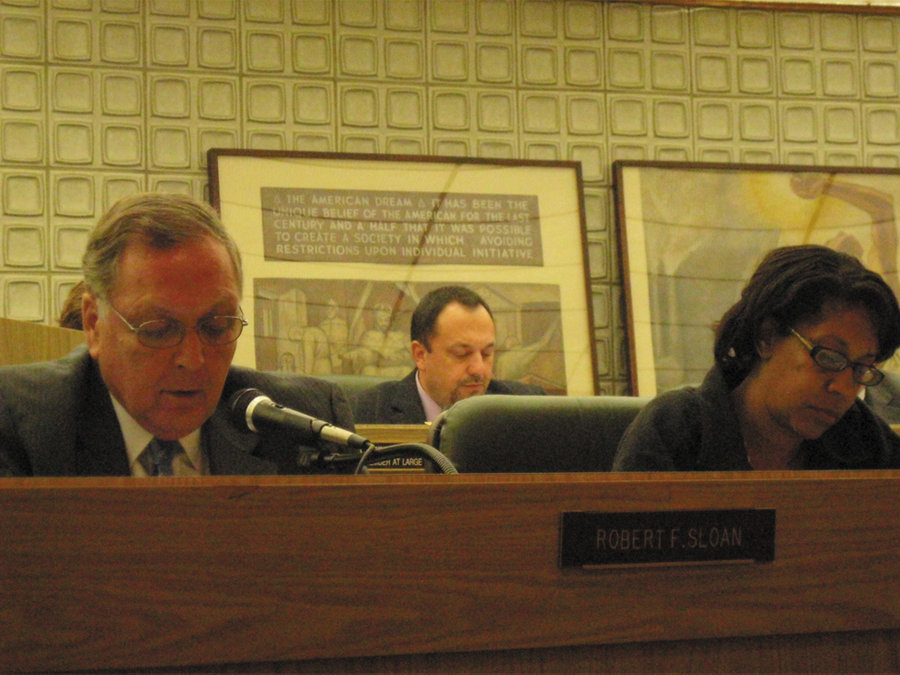Bayonne officials said that the proposed $60 million transitional budget for the six months ending on Dec. 31 will have no tax increase over the August bill, despite published reports to the contrary. However, the budget does maintain the increase taxpayers saw in their August bill over the previous fiscal year.
The city is switching from the fiscal year to calendar year, which has confused a number of people even though nobody appeared at the Sept. 21 public hearing on the six-month transitional municipal budget that would allow for the switch.
Taxes did rise going into the new budget, city officials said, due to a large loss of tax ratables (taxable properties) that had to be made up by existing taxpayers, a huge number of tax appeals the city had to pay, and the impact of county taxes which increased this year.
“Taxes did go up for the August bill. But the November bill is not going up.” – Steve Gallo
____________
Taxpayers with an average home assessed at $133,000 saw about a $150 increase in their August bills, city officials said. The November bill is expected to be exactly the same as August. The estimated bills that will go out in February and May are expected to be about $75 less for each bill than the November bill.
The first two bills in 2012 will be estimated based on the new calendar budget, which will likely be introduced and passed by mid year.
Gallo said tax appeals spiked just as the city was scheduled to change from a fiscal budget year to a calendar year.
“But that’s behind us,” he said. “The transition year budget contains no tax increase,” he said.
Earlier this year, the city voted to change its yearly budget from fiscal year (July 1 to June 30) to a calendar year, Jan. 1 to Dec. 31, and this required the city to devise a sixth-month budget to cover the gap between the end of the last fiscal calendar on June 30, 2011, and the beginning of the calendar budget on Jan. 1, 2012.
“The 2011 budget is very different than in prior years,” said Chief Financial Officer Terrence Malloy. “The transitioning to a calendar year budget will allow the city, commencing with the tax bills due in August of 2012, to send out four quarters of tax bills together.”
What’s in the budget
This six-month budget was introduced on Aug. 17.
It includes the retirement of $8.3 million in debt and sets aside $1.25 million for payment of tax appeals.
The budget, Malloy said, also sets aside $180,000 for the interlocal agreement between the city and the Parking Authority for parking enforcement officers and crossing guards.
Unlike budgets in the past, this budget will receive no funds from the Bayonne Local Redevelopment Authority, Malloy said, nor does it bond for funds to balance the budget. But it does make use of a bulk levy sale that assures the city will collect more than 99 percent of taxes owed to it.
Cost savings, Malloy said, were accomplished through a variety of means that include the implementation of a new prescription drug program, a state-mandated health insurance co-pay for employees, and a furlough day for non-uniform employees.
The city has also participated in programs with Hudson County to lower electric costs and a pool note program for reducing interest costs.
The city currently has a freeze on hiring new employees except in emergency circumstances, and has negotiated labor contracts with non-union employees that resulted in a 24-month wage freeze. New contracts for waste and recycling collection were lower.
Tax appeals, however, are an issue.
“With the decline of the real estate market, Bayonne, like all municipalities, is seeing a large increase in the number of tax appeals being filed,” Malloy said. “These appeals, most of which are successful, create a two-fold problem – financing tax refunds and having a reduction in our tax ratable base.”
Last year, he said, the value of taxable properties dropped by $60 million, and he anticipates the high level of tax appeals will continue.
Al Sullivan may be reached at asullivan@hudsonreporter.com.
